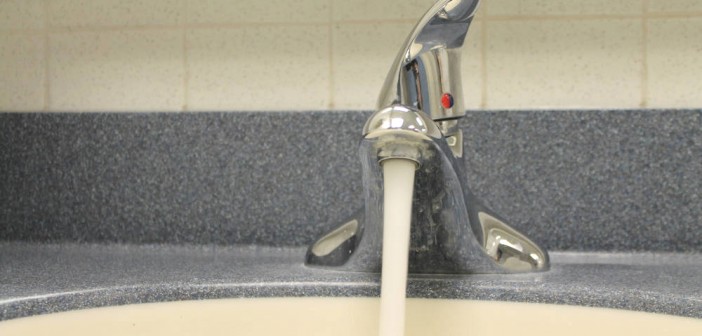After concerns about high levels of lead in water in the Lehigh Valley, Lehigh University collected water samples from residence halls and academic buildings to test the lead content in the water that students, faculty, staff and visitors use while on campus.
Lehigh’s Environmental Health and Safety Department began collecting water samples in accordance with the Environmental Protection Agency testing protocols Friday.
Barb Plohocki, the director of environmental health and safety for the past 15 years, wrote an email the day before testing began to students and staff to relay that recent testing completed by the City of Bethlehem indicated lead levels are within the standards set by the Environmental Protection Agency. She believed it was important to test the water on campus for safety reasons.
“Our goal with these proactive programs is to maintain a healthy and safe campus environment,” Plohocki said.
She said her department has not heard of any water quality issues on campus. She also said if there were cases of brown water, the discolored water could be caused by a number of factors. Because of this, she believes it is necessary to test the water.
Three members of Pi Beta Phi sorority, Alexandra Rankin, ’18, Courtney Bell, ’17, and Astrid Phillipson, ’17, said water in Pi Beta Phi’s house on the Hill was brown for a day a few months ago. Bell said the water turned brown during recruitment in January.
Phillipson said there were traces of brown in every source of water throughout the house, and the discoloration was especially noticeable in the toilet bowls. She said the color discouraged people from showering because they worried it was dirty. None of the women were aware if Lehigh had been notified about the water’s color change.
“I think it’s something that should be paid attention to more and monitored if we’re paying for nicer facilities,” Phillipson said. “I thought it was pretty gross.”
Bell, who is also a Bethlehem resident, said she has experienced brown water in her family home a few times, and it typically goes away within a day or two. She said she thinks the discolored water is safe to use, but she still tries to avoid using it until it is clear.
Environmental engineering professor Arup SenGupta said the brown coloring of water does not mean there is lead in the water because lead is colorless, odorless and tasteless. He said the pipes carrying the water may be corrosive, and this could lead to corrosive water and increase the chances of lead in the water.
SenGupta researches water science and technology nationwide and concentrates on treatment technology of lead. He said lead problems arise for the most part in developed countries in older buildings that have joints, such as pipes, with lead in them. He also said tests have shown no lead in the water in Lehigh’s STEPS building because it’s a newer facility and has no lead joints.
He analyzed samples of water from local schools, including Northeast Middle School in Bethlehem, Allen High School and Union Terrace Elementary School in Allentown, and found traces of lead. SenGupta said unless the lead content in water is extremely low or extremely high, the results are inconclusive for the most part and can fluctuate depending on the day and time, or how long the water is left running before the sample is taken.
According to 69 News, the affected schools have since ordered water testing and banned drinking from the water fountains. Both the Bethlehem and Allentown school districts said they relied on their city’s water suppliers to maintain the safety of their water. While water might be lead-free when it leaves the water treatment facilities, it could encounter lead when it comes in contact with older pipes or fixtures in the schools.
Jennifer Janco, the chief of Pediatrics at St. Luke’s University Hospital, said elevated lead levels are particularly harmful to developing brains, but symptoms in children are not always present.
Janco said all children who come to St. Luke’s are screened, and the majority do not have lead levels that are considered “unsafe.” The levels of those who do have elevated lead content are just over the standard.
Janco said the same amount of lead exposure in a teenager and in a one-year-old could produce very different results.
To prevent these harmful side effects of consuming lead, Janco advises individuals to regularly go to the doctor and have lead levels checked. She also said she encourages people to mop up dust, cover chipped paint, clean dirty surfaces and wash their hands.
Without iron, vitamin C and calcium, lead is absorbed more quickly, so it’s especially important to maintain a healthy diet. She said preventing lead problems is a community-wide effort, from parents to physicians. Allentown is an old city within an old state, and is home to these older buildings whose pipes contain lead. She added that elevated levels of lead are usually found in inner city, underserved, low-socioeconomic populations who tend to live in these older buildings.
Both Janco and SenGupta said any level of lead is harmful, and they believe decreasing the lead content in water to a level of zero is attainable and something to work toward.
“As a nation and as a state, we’ve brought the lead levels down dramatically,” Janco said. “The problem we are having locally is more a problem of infrastructure.”
Plohocki said her department is in the beginning stages of developing a water sampling protocol for buildings across Lehigh’s campus. The department will evaluate a combination of factors including the age, function and occupancy of the building, as well as other factors such as the type of water usage in those buildings.
The samples collected by the department will be sent to M. J. Reider Associates, Inc., in Reading, Pennsylvania, one of two labs certified by the Pennsylvania State Department of Environmental Protection. Plohocki said results take a few days to process and will be shared with students and staff.






Comment policy
Comments posted to The Brown and White website are reviewed by a moderator before being approved. Incendiary speech or harassing language, including comments targeted at individuals, may be deemed unacceptable and not published. Spam and other soliciting will also be declined.
The Brown and White also reserves the right to not publish entirely anonymous comments.